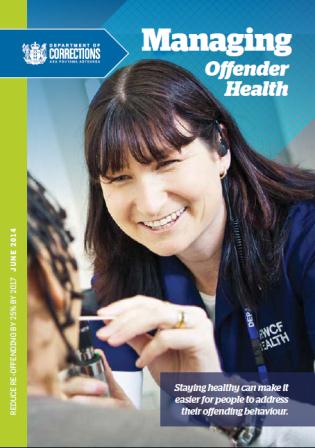Managing Offender Health brochure
Managing Offender Health is one of nine brochures we have produced that help tell our story. Printed copies are available at our probation sites and prison visits centres.
Download the Managing Offender Health (PDF 929.4MB)
 Sickness, addiction and injury can be barriers to rehabilitation and reintegration. It’s in everyone’s interests that we provide primary healthcare for offenders in prison, and help those in the community to get the healthcare they need.
Sickness, addiction and injury can be barriers to rehabilitation and reintegration. It’s in everyone’s interests that we provide primary healthcare for offenders in prison, and help those in the community to get the healthcare they need.
People in good health – mentally and physically – are better able to take partin interventions designed to help them stop offending, and to learn new skills,study towards qualifications, or find work.
Quality healthcare in prisons
Every prison has a health centre staffed by health professionals who assess, diagnose and treat prisoners with poor health. Several of our health teams have achieved external accreditation for delivering high quality public health services.
As well as giving medication, taking blood samples, and treating minor injuries, our health teams deal with medical emergencies, psychiatric issues, communicable diseases, and health education.
Common health issues among prisoners:
> heart disease
> asthma/respiratory issues
> obesity
> diabetes
> broken bones and lacerations
> mental illness
> alcohol and other drug issues.
In prisons, we assess each new arrival and arrange ongoing care and treatment for any health needs – physical or mental. We also take care to assess whether a prisoner is a risk to themselves or others.
Corrections has a duty to provide prisoners with health services ‘reasonably equivalent’ to those available in the community.
Mental health needs
Research shows that mental health disorders and illnesses are up to five times more prevalent among prisoners than in the general population. We take care to screen all new prisoners for mental health needs when they arrive to make sure they get the right level of care.
Prisoners with a mild to moderate mental health need can be referred to the prison doctor. Those with serious mental health needs are managed in partnership with local forensic mental health services.
Healthier futures
New Zealand prisons have been smoke free since 1 July 2011. In the first two years thousands of offenders accessed quit smoking support while in prison.
We encourage offenders in prison and the community to make health and lifestyle choices that can help them live crime free. Part of that is planning how to improve aspects of their physical and mental health, general, cultural and spiritual well-being, family and whänau relationships, community support and living skills.
This can help an offender get through their sentence successfully and support their reintegration. One lifestyle change prisoners must make is being smoke free. Those who need help to quit can have nicotine replacement therapy. In New Zealand, most prisoners return to the community in better health than when they arrived.
The prisoner population is ageing along with the general population. Corrections has a high dependency unit at Rimutaka Prison to cater for an increasing number of elderly prisoners and others who cannot easily care for themselves.
Dying in prison
Sometimes compassionate release for dying prisoners is not an option and we plan ahead so that death is managed with dignity and respect.
If compassionate release is not an option then the aim is to transfer a prisoner to an appropriate heath facility in the final days of life (a prisoner may wish to die in a familiar environment which may be the prison), or when the needs of the prisoner fall outside of the scope of prison healthcare.
Prisoners with physical disabilities
Prisoners with physical disabilities receive the same level of support that would be available to them in the wider community.
When a prisoner with a disability arrives in prison we develop a plan to manage their needs. We can provide supporting equipment such as wheelchairs and cells designed for people with disabilities.
What it costs
Corrections spends around $300 per prisoner per year on healthcare. This is unsubsidised because prisoners are not eligible to enrol in primary health organisations.
Quick facts
- Corrections employs more than 200 qualified nurses.
- Each day 600-700 prisoners receive care in prison health centres.
- Corrections spends around $300 on healthcare per prisoner each year.

